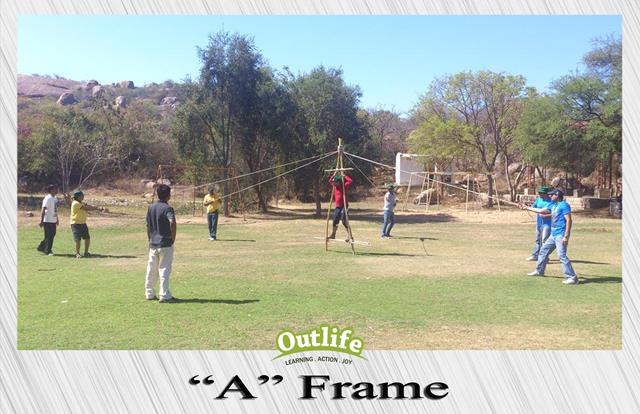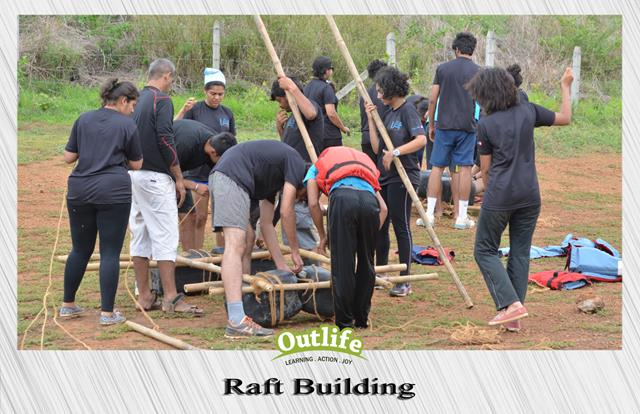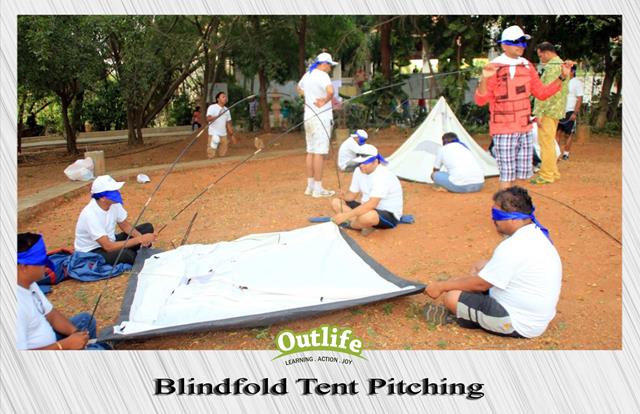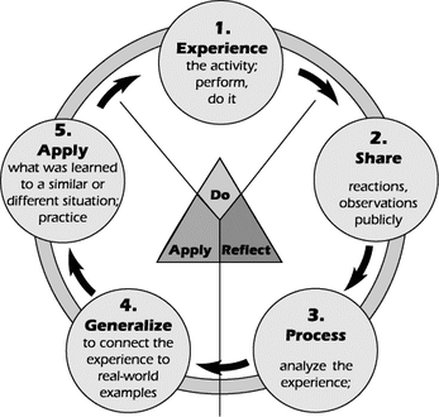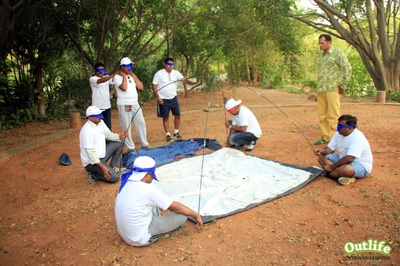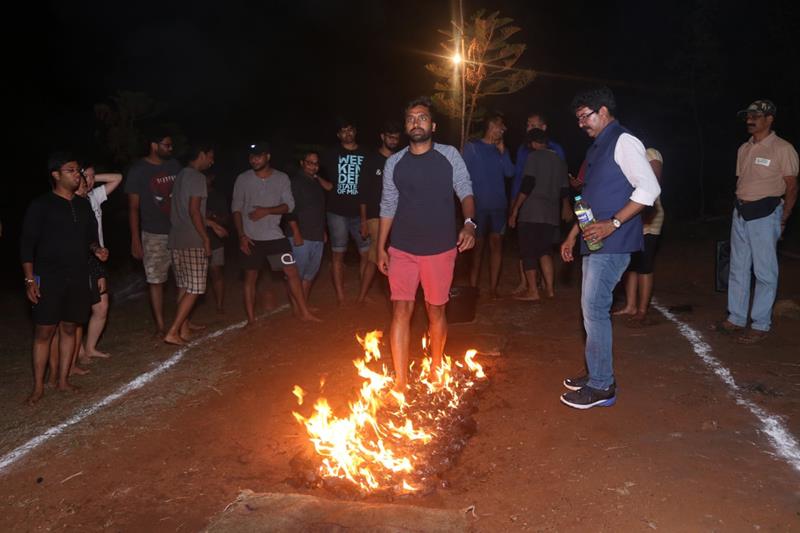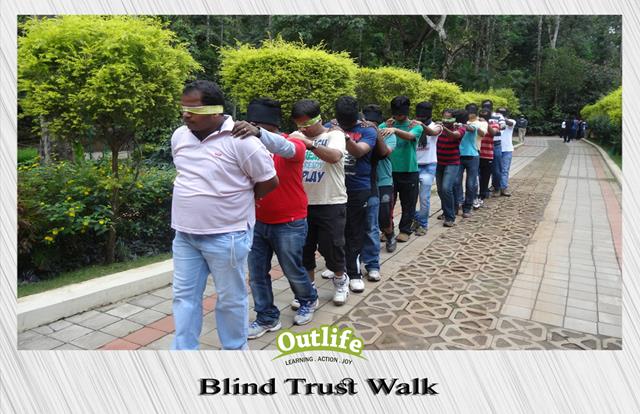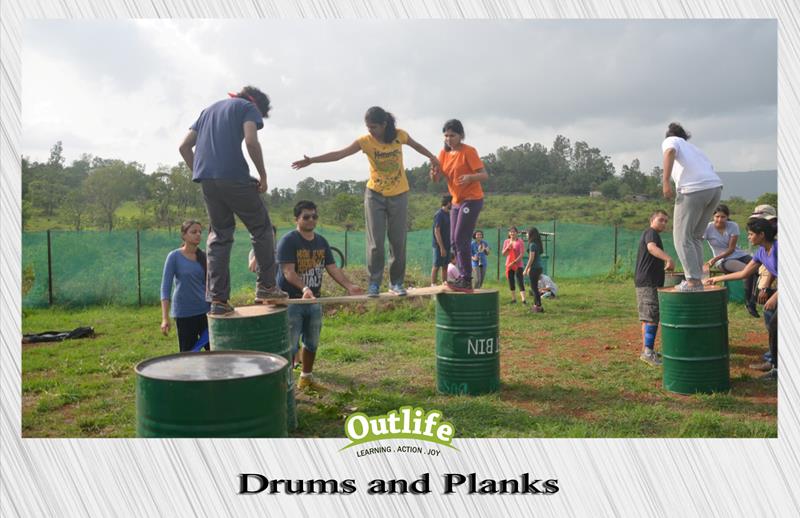Sales Performance Training | Experiential Learning
|
Are you prepared to take your sales game to new heights? Embark on an immersive journey with our experiential sales performance training, designed to transform your sales skills.
Discover the transformative power of real-world simulations, role-playing scenarios, and interactive workshops, all of which are poised to revolutionize your sales performance approach. Our hands-on approach guarantees enhanced skill retention and boosted confidence, ensuring real-world applicability that empowers sales professionals to thrive. With immediate feedback and adaptability, our program offers measurable results and is tailored to address your unique sales challenges. Take your sales team's collaboration, problem-solving, and decision-making abilities to new heights with outdoor training activities. Engage in a dynamic learning experience that is sure to amplify your sales capabilities and foster exceptional business growth. Experiential sales performance training focuses on immersive learning experiences to enhance sales skills and performance. It emphasizes practical application through simulations, workshops, and real-time feedback.
The approach aims to enhance skill retention, confidence, real-world relevance, and learner focus, while fostering team collaboration and providing measurable results. Outdoor activities like role-playing, obstacle courses, and treasure hunts are integrated for dynamic learning. Experiential learning is proven to be more effective than conventional methods, offering enhanced emotional engagement and empirical validation. Integrating experiential learning methods is crucial for elevating executive sales training and coaching to equip sales professionals with the expertise needed for exceptional performance and business growth. The key sales training benefits of this approach include enhanced motivation, skill retention, improved confidence, real-world relevance, and sharpened learner focus. Incorporating experiential learning and outdoor activities, this effective training method also bolsters team collaboration and skill development, aligning with training objectives for sales performance improvement.
|
Contact Us |
Experiential Sales performance is for:
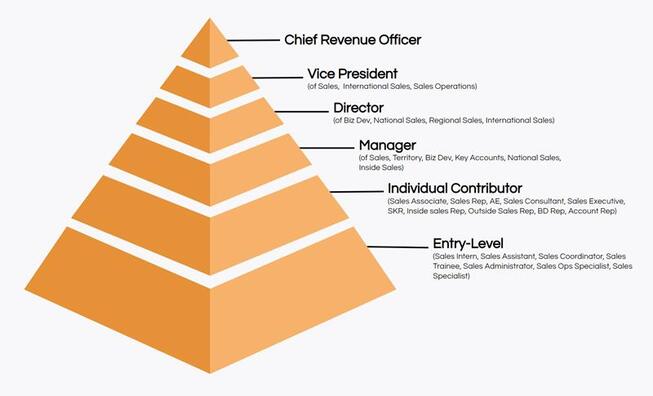
Our Sales Performance Training Programs are offered for.
- Sales Performance Training for CFO, CRO, VP, Director, Senior executives.
- Sales Performace Training for Sales Managers, Team Managers
- Sales Performance Training for Sales Executives, Consultants, Associates, Interns.
Sales Performance Training for Sales Senior management and executives focuses on overseeing leading and coaching sales team to set realistic sales goals that align with financial targets. develop and implement sales strategies, manage sales personnel, and track sales performance metrics. coaching and mentoring salespeople, developing sales plans, and overseeing the day-to-day operations of their sales team in simulated environments.
Sales Performance Training for Sales and Team managers focuses on key responsibility areas of Leading and Coaching, Strategy and Planning, Recruitment and Onboarding, Performance Management, Sales Pipeline Management, Relationship Building.
Sales Performance Training for Sales executies and Sales Associate's focuses on developing future leaders with essential sales skills like Target Achievement, Lead Generation & Qualification, Building Relationships & Presentations, Negotiation & Closing Deals, Customer Service, Customer Interaction & Support, Upselling & Cross-Selling:
Sales Performance Training for Sales and Team managers focuses on key responsibility areas of Leading and Coaching, Strategy and Planning, Recruitment and Onboarding, Performance Management, Sales Pipeline Management, Relationship Building.
Sales Performance Training for Sales executies and Sales Associate's focuses on developing future leaders with essential sales skills like Target Achievement, Lead Generation & Qualification, Building Relationships & Presentations, Negotiation & Closing Deals, Customer Service, Customer Interaction & Support, Upselling & Cross-Selling:
Developing Sales Performance Mastery
Our focus with the experiential sales performance training is to focus on sales goals attainment that include Sales Mastery in the following areas:
- Knowledge Foundation:
- Deep understanding of your product/service and its value proposition.
- Intimate knowledge of your target market and their needs.
- Mastery of the sales process and its different stages.
- Communication Expertise:
- Excellent verbal and written communication skills.
- Ability to actively listen and understand customer needs.
- The power to present persuasively and build rapport.
- Relationship Building:
- Focus on building trust and long-term relationships with customers.
- Genuine interest in understanding customer challenges.
- Ability to become a trusted advisor, not just a salesperson.
- Selling Skills:
- Proficiency in prospecting and qualifying leads.
- Effective objection handling techniques to address customer concerns.
- Skillful negotiation to reach mutually beneficial agreements.
- Continuous Improvement:
- Commitment to ongoing learning and development.
- Analyzing sales data and identifying areas for improvement.
- Seeking feedback and coaching to refine your approach.
- Resilience and Persistence:
- Ability to handle rejection and bounce back from setbacks.
- Persistence in overcoming challenges and achieving sales goals.
- Maintaining a positive and motivated attitude.
Developing Sales Competencies
- Strategic Vision & Alignment:
- Ability to translate company goals into clear and actionable sales strategies.
- Aligning the sales team with overall business objectives.
- Adapting strategies based on market changes and competitor activity.
- Coaching & Development:
- Providing effective coaching and mentorship to individual salespeople.
- Identifying talent and fostering career growth within the team.
- Creating a culture of continuous learning and improvement.
- Motivation & Inspiration:
- Creating a positive and motivating work environment.
- Inspiring the team to achieve their full potential.
- Recognizing and rewarding achievements.
- Communication & Collaboration:
- Excellent communication skills to clearly articulate goals and strategies.
- Fostering open communication and collaboration within the sales team.
- Effectively communicating with senior management and other departments.
- Data Analysis & Insights:
- Ability to interpret sales data and identify trends and opportunities.
- Setting clear and measurable sales goals and performance metrics.
- Utilizing data to make informed decisions and guide strategy.
- Building & Managing Teams:
- Recruiting, hiring, and onboarding top sales talent.
- Managing team performance and holding individuals accountable.
- Building a cohesive and collaborative sales team.
- Customer Focus & Relationship Management:
- Understanding customer needs and building strong customer relationships.
- Developing strategies to acquire and retain customers.
- Advocating for the customer's voice within the organization.
Advantages of Experiential Sales Performance Training
Sales Performance Training with experiential learning is a unique approach to developing sales leadership skills that takes place outside the traditional classroom or office setting. It involves hands-on, immersive experiences that challenge participants to develop their leadership skills in real-world scenarios.
Sales Leadership training aims to help individuals become better leaders by providing them with opportunities to learn, practice, and apply their skills in a safe and supportive environment.
Sales Leadership training aims to help individuals become better leaders by providing them with opportunities to learn, practice, and apply their skills in a safe and supportive environment.
- Role-Playing and Simulation A pivotal element of any sales training program is the immersive experience participants gain during sales training workshops. These scenarios are crucial for practicing and refining sales techniques in a supportive environment, a cornerstone of training for sales teams.
- Interactive Workshops Sales training workshops are crafted to be highly interactive, weaving in group activities, case studies, and peer feedback. This approach to training delivery ensures active learning and ongoing skill development, making it a valuable component of any sales workshop.
- Real-Time Feedback Sales leaders gain invaluable insights from the sales coaching process, benefiting from immediate performance evaluation during training sessions. This feedback, whether from trainers, peers, or mentors, empowers them to make real-time adjustments and refine their sales approach.
- Effective Coaching Through Immediate Feedback: The apex of sales coaching effectiveness is achieved with real-time coaching services during experiential learning exercises, such as role play. Here, immediate feedback from instructors and facilitators is a key component of the sales coaching process, actively enhancing the training experience.
- Adaptability and FlexibilityOur sales training programs are meticulously crafted to cater to the distinct needs and challenges of the participants, offering a high degree of customized sales training. This personalized approach significantly boosts the applicability and relevance for each individual's specific sales role.
- Application-Oriented LearningOur sales training method places a strong emphasis on the practical application of sales skills in real-world scenarios, fostering a profound understanding and mastery of effective sales strategies and training for sales team. This hands-on approach guarantees that the sales training program's principles are not just comprehended but also ready for immediate implementation.
We take a custom approach to the design and delivery of all our outbound leadership offerings. Our focus with such a approach is to understand the organisations leadership, business needs and imbibe them into the learning design such that the participants can apply them back at the workplace.
The facilitation approach has a participatory, experiential learning platform, where the participants get many opportunities to explore their leadership roles in an organizations business context and Leadership Pipeline.
The facilitation approach has a participatory, experiential learning platform, where the participants get many opportunities to explore their leadership roles in an organizations business context and Leadership Pipeline.
The Sales Leadership programs actvities include outbound actvities, communication activities, interactive sessions, group exercises, team coaching, management games, time management activities, roles plays, psychometric assessments, and debriefing sessions to transfer the learning to the workplace settings.
We include plenty of opportunities for learners to apply key leadership and management concepts, using anchors, scenarios and simulations, personal action plans and accountability partners
We include plenty of opportunities for learners to apply key leadership and management concepts, using anchors, scenarios and simulations, personal action plans and accountability partners
The impact of Experiential Sales performance training.
Experiential learning can revolutionize sales performance training by going beyond theory and into the realm of practical application. Here's how it impacts training effectiveness:
In essence, experiential learning bridges the gap between theory and practice, creating well-rounded salespeople with the skills, confidence, and adaptability to excel in the field. This translates to a significant and measurable impact on overall sales performance.
- Supercharged Learning & Retention: Traditional lectures often struggle with low information retention. Experiential activities like simulations and role-playing create a "learning by doing" environment. Salespeople actively engage with the material, boosting knowledge retention and fostering a deeper understanding of sales concepts and techniques.
- Skills Honed in a Safe Space: Experiential training provides a platform to practice crucial sales skills like communication, objection handling, and negotiation. Through activities like mock calls and presentations in a controlled environment, salespeople can experiment, receive immediate feedback, and refine their skills without the pressure of real-world consequences. This safe space allows for focused improvement and builds confidence before salespeople face real customers.
- Confidence Boost for Sales Success: Successfully navigating challenges and completing experiential exercises instills a sense of accomplishment and boosts confidence. This translates directly into the real world. Salespeople are better equipped to handle objections, navigate difficult conversations, and close deals with a newfound sense of self-belief.
- Teamwork & Communication Flourish: Many experiential activities necessitate collaboration and communication. Working together to solve problems or achieve goals in simulations fosters teamwork and communication skills within the sales team. This translates into stronger collaboration in the field, where salespeople can support and learn from each other, leading to a more cohesive and effective sales force.
- Problem-Solving & Adaptability Sharpened: Experiential learning throws curveballs, mirroring real-world sales situations. By navigating these challenges in a controlled environment, salespeople hone their problem-solving skills and develop the ability to adapt to unforeseen circumstances during sales interactions. This agility is crucial for success in the dynamic world of sales.
- Motivation & Engagement Soar: Experiential learning is inherently engaging. The interactive nature and novelty of these activities keep salespeople motivated and focused, leading to a more positive and enthusiastic approach to sales training. This translates into a more motivated and energized salesforce after the training is complete.
In essence, experiential learning bridges the gap between theory and practice, creating well-rounded salespeople with the skills, confidence, and adaptability to excel in the field. This translates to a significant and measurable impact on overall sales performance.
Sales Performance - The Outbound Experiential Way
The experiential learning component of outbound leadership training is a key element of its effectiveness. It involves interactive, engaging, and immersive outbound activities that help participants learn by doing, reflecting, and applying their new knowledge and skills to real-world situations.
Experiential learning, adult learning, action learning, peer learning, reflection, practice, and application is built in and reinforced in the development program by design. The Programme is custom designed to the learning needs of the participants and not only provides insight and understanding of leadership skills but the application and practice through the behavioral learning simulations.
The participants experience a real world simulation of the learning objectives and the relevant aspects of bringing change in managing self, team, and the organization
Experiential learning, adult learning, action learning, peer learning, reflection, practice, and application is built in and reinforced in the development program by design. The Programme is custom designed to the learning needs of the participants and not only provides insight and understanding of leadership skills but the application and practice through the behavioral learning simulations.
The participants experience a real world simulation of the learning objectives and the relevant aspects of bringing change in managing self, team, and the organization
Sales Performance through Expereintial Learning Simulations
Designing effective experiential learning activities for leadership development requires careful consideration of the specific competencies and capabilities that organizations aim to enhance. The activities are immersive, challenging, and directly applicable to the complexities of leadership roles, providing leaders with opportunities to practice and refine their skills in a controlled yet realistic environment.
1. Simulated Decision-Making Scenarios:
Creating scenarios that require leaders to make critical decisions under pressure simulates the challenges they may face in their roles. These scenarios can range from crisis management simulations to strategic decision-making exercises, allowing leaders to test their judgment and decision-making processes in a risk-free setting.
2. Team-Based Problem-Solving Challenges:
Engaging leaders in team-based challenges that require collaboration, communication, and creative problem-solving fosters the development of cohesive and high-performing teams. These challenges can involve complex projects, conflict resolution simulations, or cross-functional problem-solving exercises that mirror real-world team dynamics.
3. Role-Playing and Leadership Simulations:
Role-playing exercises and leadership simulations provide leaders with the opportunity to step into different leadership roles and practice their interpersonal and decision-making skills. These activities offer a safe space for leaders to experiment with various leadership styles and approaches, gaining valuable insights into their strengths and areas for improvement.
4. Outdoor and Adventure-based Activities:
Outdoor experiential activities, such as ropes courses, wilderness expeditions, and adventure challenges, push leaders outside their comfort zones and encourage risk-taking and resilience. These activities promote teamwork, trust-building, and adaptive leadership in unfamiliar and unpredictable environments.
5. Business Strategy Games and Simulations:
Business strategy games and simulations immerse leaders in dynamic business environments, allowing them to test their strategic thinking, financial acumen, and competitive decision-making. These simulations provide a platform for leaders to apply theoretical concepts to practical business scenarios, honing their strategic leadership capabilities.
1. Simulated Decision-Making Scenarios:
Creating scenarios that require leaders to make critical decisions under pressure simulates the challenges they may face in their roles. These scenarios can range from crisis management simulations to strategic decision-making exercises, allowing leaders to test their judgment and decision-making processes in a risk-free setting.
2. Team-Based Problem-Solving Challenges:
Engaging leaders in team-based challenges that require collaboration, communication, and creative problem-solving fosters the development of cohesive and high-performing teams. These challenges can involve complex projects, conflict resolution simulations, or cross-functional problem-solving exercises that mirror real-world team dynamics.
3. Role-Playing and Leadership Simulations:
Role-playing exercises and leadership simulations provide leaders with the opportunity to step into different leadership roles and practice their interpersonal and decision-making skills. These activities offer a safe space for leaders to experiment with various leadership styles and approaches, gaining valuable insights into their strengths and areas for improvement.
4. Outdoor and Adventure-based Activities:
Outdoor experiential activities, such as ropes courses, wilderness expeditions, and adventure challenges, push leaders outside their comfort zones and encourage risk-taking and resilience. These activities promote teamwork, trust-building, and adaptive leadership in unfamiliar and unpredictable environments.
5. Business Strategy Games and Simulations:
Business strategy games and simulations immerse leaders in dynamic business environments, allowing them to test their strategic thinking, financial acumen, and competitive decision-making. These simulations provide a platform for leaders to apply theoretical concepts to practical business scenarios, honing their strategic leadership capabilities.
Experiential Activities for Sales Performance Training
To enhance sales transformation, integrating outdoor training activities can be a game-changer, fostering team collaboration and skill development. Here are some cutting-edge strategies to consider:
1. Role-Playing Scenarios
2. Outdoor Obstacle Course
3. Treasure Hunt
4. Wilderness Survival Training
5. Glasswalk and Firewalk Activities:
Glasswalk and firewalk activities can be powerful tools in experiential sales performance training
1. Role-Playing Scenarios
- Create outdoor role-playing scenarios that mimic real sales situations.
- During sales training programs, assigning different roles to team members and letting them engage in a simulated sales environment enriches the experience, as they practice role play in sales scenarios.
- Encourage constructive feedback and discussion after each scenario.
2. Outdoor Obstacle Course
- Design an obstacle course that requires problem-solving, teamwork, and communication.
- Incorporate sales-related tasks or challenges within the course to simulate real-life sales hurdles.
3. Treasure Hunt
- To create an engaging sales training session, consider organizing a sales-themed treasure hunt. This interactive approach allows participants to unravel clues intricately tied to essential sales strategies, products, or effective customer interactions.
- This activity promotes teamwork, strategic thinking, and quick decision-making.
4. Wilderness Survival Training
- Engage in wilderness survival activities that require teamwork, leadership, and adaptability.
- During sales training, it's beneficial to draw parallels between survival skills and overcoming sales challenges. Highlighting resilience in sales and the necessity for quick thinking when faced with adversity can underscore the skills needed for success.
5. Glasswalk and Firewalk Activities:
Glasswalk and firewalk activities can be powerful tools in experiential sales performance training
- Confronting Fears & Building Resilience: Glasswalk and firewalk activities introduce controlled risk, pushing salespeople to face their fears and develop mental toughness. This translates to handling sales challenges and rejection with greater resilience.
- Confidence Boost: Successfully completing these activities instills a sense of accomplishment and boosts confidence. Salespeople realize they can overcome obstacles and achieve goals that initially seemed impossible.
- Tenacity in Sales: The newfound confidence translates into a more tenacious approach to sales. They are better equipped to handle rejection and bounce back from setbacks.
6. Outbound Training exercises
By providing participants with opportunities to learn, practice, and apply their skills in real-world scenarios, outbound training with experiential learning can help individuals become more effective leaders and better equipped to handle the challenges of the modern salesforce.
These activities can include challenges
- Adventure Activities like rock climbing, rappeling, High Rope Courses, white water rafting
- Challenging Team Activities like drums and planks, crossover, Hot Plate.
The Outbound Training exercises help with
- Engaged Learning & Stronger Memory: Outbound activities takes sales training outdoors, boosting engagement and focus. This leads to better information retention of the sales training content.
- Behaviours in Action: Collaboration and communication are key to success in outdoor challenges. These activities provide a dynamic setting to practice these crucial sales skills.
- Comfort Zone Challenge & Confidence Boost: Stepping outside the classroom pushes salespeople beyond their comfort zones. Overcoming outdoor challenges builds resilience and confidence, translating to a stronger sales approach.
- Communication & Teamwork: Many outdoor activities require clear communication and teamwork to succeed. These exercises hone these skills, leading to better collaboration and adaptability within the sales team.
- Creative Problem-Solving: The change of scenery in outbound training sparks creativity. Problem-solving is enhanced as teams devise strategies for outdoor challenges, improving their ability to think on their feet in sales conversations.
- Stronger Team Bonds: Shared experiences in nature create a more relaxed environment. Overcoming challenges together fosters camaraderie and stronger relationships within the sales team, leading to improved collaboration and support.
Our Leadership Faculty and Facilitators
The program are specially facilitated by senior facilitators with 2 decades of industry experience in a senior management or executive management roles and having over a decade of experience in sales function, leading and coaching, develop and implement sales strategies, drive and track sales performance.
The Supporting Instructors are Qualified Outdoor Instructors who are trained to take of safety and risk management to enable usage of adventure and outdoor activities for management development training purposes.
The Supporting Instructors are Qualified Outdoor Instructors who are trained to take of safety and risk management to enable usage of adventure and outdoor activities for management development training purposes.
Sales Performance Training Locations
The importance of continuously training leaders cannot be understated. The ambience in which this training is delivered is essential too. We choose outbound facilities close to nature, far away from the distractions of city life. Accommodation includes AC Cottages, Dormitories, Swiss Cottage Tents, Alpine Tents and Conference halls for discussions and debriefing.
We currently operate out of Hyderabad, Bangalore, Chennai, Pune, Mumbai, Delhi and Kolkata and can source a good outbound training venue near you.
We currently operate out of Hyderabad, Bangalore, Chennai, Pune, Mumbai, Delhi and Kolkata and can source a good outbound training venue near you.
Sample Proposal and Agenda for Sales Performance Training
| outlife-experiential-sales-performance-training.pdf | |
| File Size: | 924 kb |
| File Type: | |
FAQ on Sales Performance Training
What is experiential sales performance training?
Experiential sales performance training is an immersive approach that strengthens sales skills and boosts performance. This effective sales training cornerstone promotes active participation and practical application, using real-world simulations to provide sales professionals with actionable insights and a robust sales strategy for success.
What are the key features of experiential sales performance training?
What are the benefits of experiential sales performance training?
How can outdoor training activities enhance sales performance training?
How can outdoor training activities enhance sales performance training?
Outdoor sales training moves beyond the traditional classroom to enhance engagement and memory retention. These innovative activities encourage salespeople to collaborate in dynamic environments, honing their teamwork and communication skills, which are vital for sales success. This outdoor experience not only builds confidence and creativity but also solidifies team bonds, resulting in a more motivated and adept salesforce equipped to surpass their goals.
What are the benefits of experiential sales performance training?
Enhancing communication skills, negotiation skills, and relationship building through this type of training can significantly elevate confidence, motivation, and overall sales performance. It's a comprehensive approach to honing objection handling and fostering robust professional relationships.
Who should attend experiential sales performance training?
Sales training for all levels, including skill refinement for seasoned professionals, is invaluable. Whether you're a new recruit or an experienced salesperson, this training is tailored to polish your abilities and enhance your career.
What format will the training take?
Experiential sales training can be delivered outdoors and inhouse in a blended format.
How long is the sales training program?
The program length for sales training is flexible, catering to the organization's needs and participants' needs. Sessions may span from a concise few hours to an extensive several-day workshop, ensuring a customized learning experience.
What materials are included?
A diverse array of training materials, such as role plays, simulations, and outdoor exercises, alongside workbooks, online modules, and case studies, are utilized. Participants also gain access to ongoing coaching or support resources to reinforce their learning.
What sales skills will be covered?
Depending on the chosen program, the sales skills covered can range from sales motivation and prospecting to qualifying leads, building rapport, and honing presentation skills. Additionally, participants will learn objection handling, closing techniques, and effective post-sale follow-up strategies.
How will I be able to apply what I learn to my real-world sales situations?
The training's experiential nature allows participants to engage in a simulated environment, where they can practice new skills and gain confidence in sales. Receiving feedback in training is crucial for them to feel prepared when applying these skills in real sales scenarios.
Will there be opportunities to practice and receive feedback?
Indeed, experiential training emphasizes hands-on practice through role-playing, group exercises, and immersive simulations. Trainers offer constructive feedback, which is instrumental in refining participants' selling skills and enhancing their sales acumen.
Experiential sales performance training is an immersive approach that strengthens sales skills and boosts performance. This effective sales training cornerstone promotes active participation and practical application, using real-world simulations to provide sales professionals with actionable insights and a robust sales strategy for success.
What are the key features of experiential sales performance training?
- Role-Playing and Simulation: Participants are immersed in realistic sales scenarios.
- Interactive Workshops: Designed to be interactive, incorporating group activities and case studies.
- Real-Time Feedback: Sales leaders benefit from immediate feedback during sessions.
- Adaptability and Flexibility: Meticulously designed to adapt to the unique needs of the participants.
What are the benefits of experiential sales performance training?
- Enhanced Skill Retention: Actively engaging in practical exercises boosts retention.
- Improved Confidence: Practicing in a controlled environment significantly boosts confidence.
- Real-World Relevance: Includes real-world sales simulations that mirror actual sales situations.
- Enhanced Learner Focus: The presence of an instructor amplifies the learner's dedication.
How can outdoor training activities enhance sales performance training?
- Role-Playing Scenarios: Mimic real sales situations in an outdoor setting.
- Outdoor Obstacle Course: Requires problem-solving, teamwork, and communication.
- Treasure Hunt: Engaging activity promoting teamwork and strategic thinking.
- Wilderness Survival Training: Draws parallels between survival skills and sales challenges.
How can outdoor training activities enhance sales performance training?
Outdoor sales training moves beyond the traditional classroom to enhance engagement and memory retention. These innovative activities encourage salespeople to collaborate in dynamic environments, honing their teamwork and communication skills, which are vital for sales success. This outdoor experience not only builds confidence and creativity but also solidifies team bonds, resulting in a more motivated and adept salesforce equipped to surpass their goals.
What are the benefits of experiential sales performance training?
Enhancing communication skills, negotiation skills, and relationship building through this type of training can significantly elevate confidence, motivation, and overall sales performance. It's a comprehensive approach to honing objection handling and fostering robust professional relationships.
Who should attend experiential sales performance training?
Sales training for all levels, including skill refinement for seasoned professionals, is invaluable. Whether you're a new recruit or an experienced salesperson, this training is tailored to polish your abilities and enhance your career.
What format will the training take?
Experiential sales training can be delivered outdoors and inhouse in a blended format.
How long is the sales training program?
The program length for sales training is flexible, catering to the organization's needs and participants' needs. Sessions may span from a concise few hours to an extensive several-day workshop, ensuring a customized learning experience.
What materials are included?
A diverse array of training materials, such as role plays, simulations, and outdoor exercises, alongside workbooks, online modules, and case studies, are utilized. Participants also gain access to ongoing coaching or support resources to reinforce their learning.
What sales skills will be covered?
Depending on the chosen program, the sales skills covered can range from sales motivation and prospecting to qualifying leads, building rapport, and honing presentation skills. Additionally, participants will learn objection handling, closing techniques, and effective post-sale follow-up strategies.
How will I be able to apply what I learn to my real-world sales situations?
The training's experiential nature allows participants to engage in a simulated environment, where they can practice new skills and gain confidence in sales. Receiving feedback in training is crucial for them to feel prepared when applying these skills in real sales scenarios.
Will there be opportunities to practice and receive feedback?
Indeed, experiential training emphasizes hands-on practice through role-playing, group exercises, and immersive simulations. Trainers offer constructive feedback, which is instrumental in refining participants' selling skills and enhancing their sales acumen.

